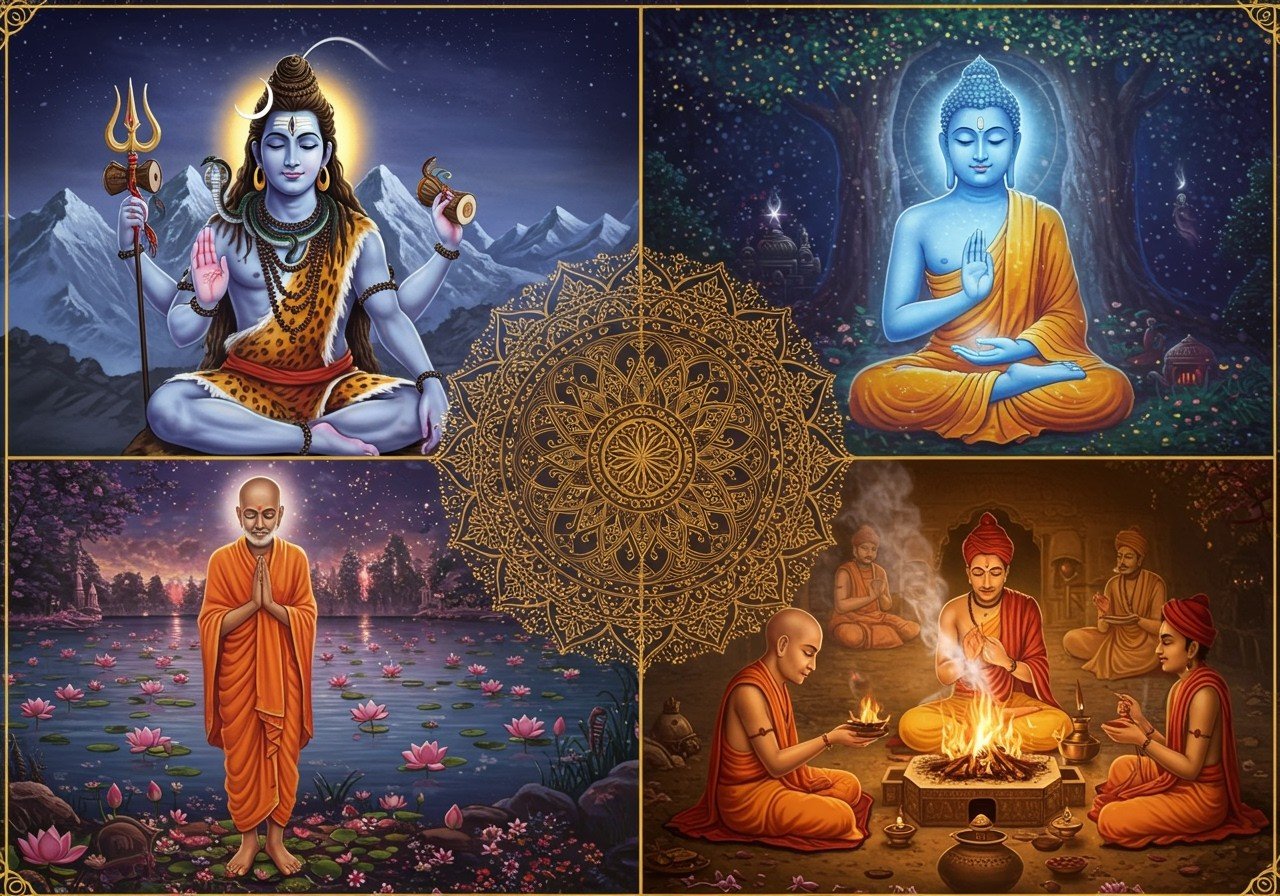
Ancient India, a land of vibrant cultures and profound spirituality, is renowned for its diverse religious traditions. This blog delves into the ancient religions of India, exploring their unique beliefs, practices, and enduring influence on the world.
Origins and Development of Ancient Religions
Earliest Practices
The Indus Valley Civilization (c. 3300-1300 BCE) provides glimpses into early religious practices. Evidence suggests reverence for proto-Shiva figures, mother goddesses, and natural elements like fire, water, and trees, indicating a deep connection with the natural world.
Vedic Period and Thought
The Vedic period (c. 1500-500 BCE) significantly shaped Indian religious thought. The Vedas, sacred texts from this era, introduced core concepts like Dharma (duty or righteous conduct) and Yajnas (sacrificial rituals). These ideas became foundational for later Hindu traditions. The Vedic religion, documented in the Samhitas, evolved into what we know today as Hinduism.
Emergence of Jainism and Buddhism
The Shramana movement, distinct from the Vedic tradition, gave rise to Jainism and Buddhism. Jainism, with its emphasis on non-violence (ahimsa) and asceticism, offered a path to liberation through rigorous self-discipline. Buddhism, founded by Siddhartha Gautama (the Buddha), focused on the cessation of suffering and the pursuit of enlightenment through meditation and mindful living.
Influence of Dravidian Culture
Dravidian culture, prevalent in South India, contributed to the rich tapestry of religious practices. The worship of local deities and nature spirits became interwoven with broader Indian traditions, further diversifying the spiritual landscape.
Concept of Sanatana Dharma
Sanatana Dharma, often translated as “eternal duty” or “eternal order,” became a central concept. It embodies the idea of a timeless moral order governing the universe and guiding human conduct.
Key Beliefs and Practices
Dharma
Dharma, a cornerstone of ancient Indian religions, signifies ethical and moral duties. Adhering to dharma is essential for maintaining cosmic balance and individual well-being.
Rituals and Ceremonies
Rituals and ceremonies play a vital role. In Hinduism, Pujas (worship ceremonies) and Yajnas (sacrificial rituals) are common practices. Jainism observes festivals like Paryushana, a period of fasting, prayer, and self-reflection. Buddhism emphasizes meditation and mindfulness practices.
Karma and Reincarnation
The concepts of Karma (actions and their consequences) and reincarnation (rebirth) are widely prevalent. The belief that actions in this life influence future lives encourages ethical behavior and spiritual growth.
Meditation and Ascetic Practices
Meditation and ascetic practices are central to spiritual development, particularly in Buddhism and Jainism. These practices aim to cultivate inner peace, detach from worldly desires, and attain liberation.
Poojn.in: Your Source for Religious and Cultural Needs
Poojn.in, India’s leading online store for cultural goods and services, offers a wide selection of products to support your religious practices.
- Explore a diverse range of mala beads, including Tulsi malas and Bel malas, crafted with authentic materials.
- Enhance your puja space with sacred statues, including Shiva Lingams and Adiyogi statues, meticulously crafted for reverence and devotion.
- Discover a variety of incense sticks and other puja essentials to create a sacred ambiance for your rituals and ceremonies. Also, check out our collection of sindoor containers and Laddu Gopal statues.
Poojn.in is committed to providing high-quality products and resources to support your spiritual journey.
FAQs
What were some of the earliest religious practices in India? Evidence from the Indus Valley Civilization suggests worship of figures resembling Shiva, mother goddesses, and reverence for nature.
How did the Vedic period influence Indian religions? The Vedic period introduced key concepts like Dharma and Yajnas, which became foundational for later Hinduism. The Vedas, sacred texts from this era, contain hymns, rituals, and philosophical insights.
What are the core beliefs of Jainism? Jainism emphasizes non-violence, truthfulness, non-stealing, celibacy, and non-attachment. Its followers strive for liberation through rigorous ethical conduct and ascetic practices.
Conclusion
The ancient religions of India represent a profound and enduring spiritual heritage. From the early practices of the Indus Valley Civilization to the philosophical depths of Vedanta, Jainism, and Buddhism, these traditions have shaped the cultural and spiritual landscape of India for millennia. As India continues to evolve, these ancient beliefs and practices remain a source of wisdom, inspiration, and continuity, offering pathways to spiritual growth and self-discovery.
Learn more about the Vedas and their practical application in modern life: Vedas: Ancient Wisdom for Modern Life.
Explore the holistic approach of Yoga and Ayurveda: Yoga & Ayurveda: A Holistic Wellbeing Approach.
Discover the power of mantra chanting: Mantra Chanting: Sound Vibration & Healing Power.


